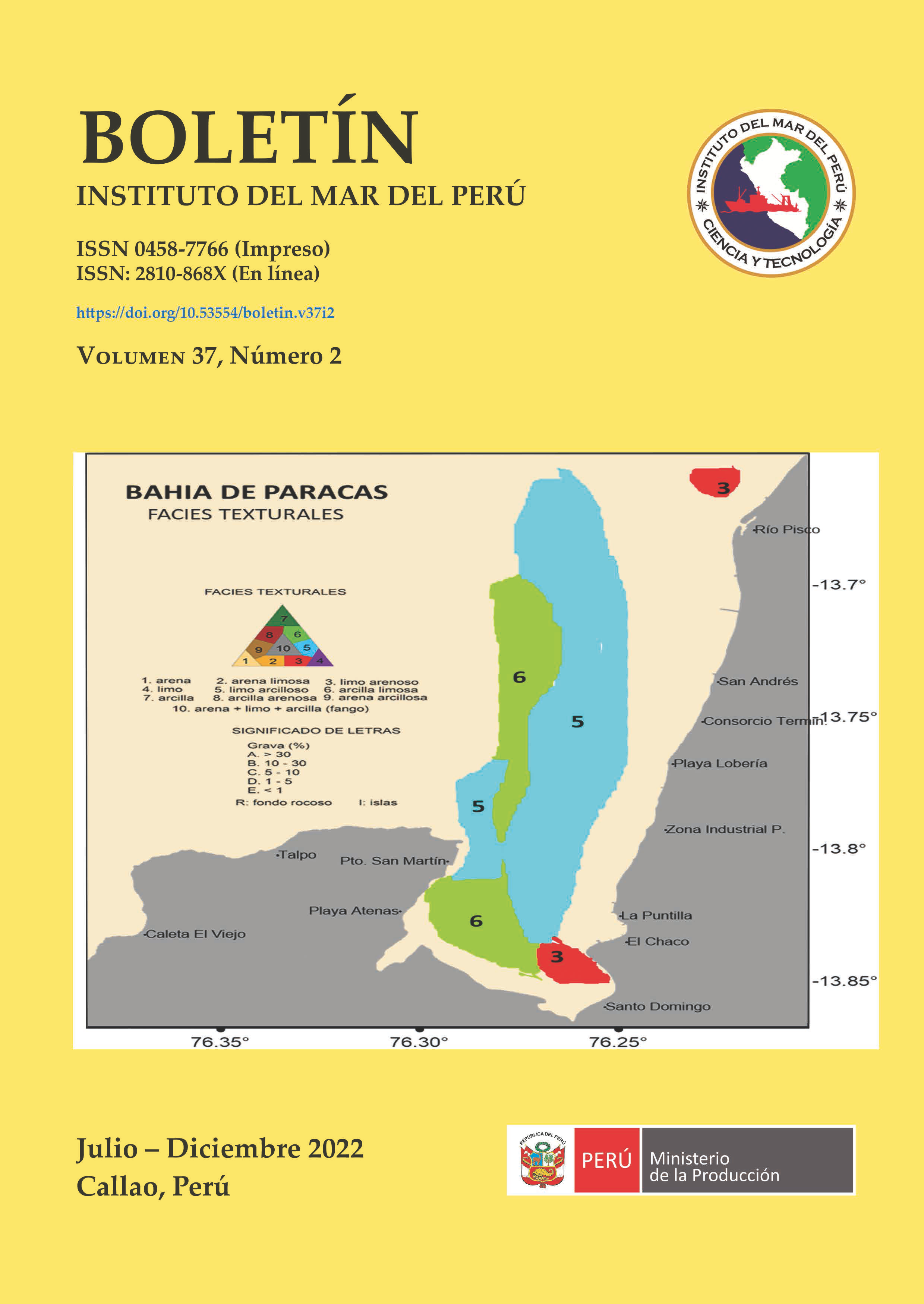Sedimentological and geochemical characteristics of recent sediments from Paracas Bay, Pisco (2013, 2014, and 2015)
DOI:
https://doi.org/10.53554/boletin.v37i2.377Keywords:
Granulometría, Sedimentos Marinos, Sedimentología, Materia Orgánica, bahía de Paracas, Perú -PiscoAbstract
During 2013, 2014, and 2015, we analyzed the sedimentological and geochemical characteristics of recent marine surface sediments from Paracas Bay, as part of the projects “Integrated Study of the Dynamics of Physical and Biogeochemical Processes in Coastal Edge Ecosystems” and “Global Environment Facility”. At Paracas Bay, recent sediments correspond to clayey silt, silty clay, and sandy silt textures, which are associated with low current intensities. The sandy sediments were recorded near the coastline and the mouth of the Pisco River, the presence of gravel is very scarce (<1%) found north of the river. The current and waves increase in the coastal area, transporting finer material to places where the current is lower. The highest values of total organic matter correspond to the fine fraction made up of silt and clay, which is conditioned by the contribution of biogenic material related to the high biological productivity in the water column, and also by the presence of very fine particles of urban and industrial waste, which are incorporated to the bottom by transport and sedimentation processes. The greatest variation was found in the southern part of the bay between Puntilla and El Chaco, with values ranging from 12.21 to 17.80%; while the lowest total organic matter contents are associated with sediments dominated by the sand fraction and were found north of the Pisco River, with values of 3.16 to 3.21%, corresponding to evaluations conducted in spring 2014 and winter 2015. The inner bay is occasionally affected by anthropogenic pollutants due to north winds and southward marine circulation.
Downloads
Alternative Metrics
Metrics
References
Dean, W. (1974). Determination of Carbonate an Organic matter in calcareous sediments and rocks by loss on ignition: Comparison the others methods. Jour. Sed. Petrology, 44 (1), 242-248.
DHN. (1988). Hidronav.1988. Derrotero de la costa del Perú. Dirección de Hidrografía y Navegación. Segunda Edición, 2, 58-60
Galehouse, J. (1971). Sedimentation Analysis Procedures in Sedimentary Petrology. Eds. Carver, RE, New York, de Cap. 4.P, 69-94.
Ingram, R. (1971). Sieve Analysis. In: procedures in Sedimentary Petrology. Eds. Carver, New York. RE, de. Cap. 3, 49-67.
Morón, O., Quispe, J., Lorenzo, A., Flores, G., Sánchez, S., Aronés, K., Solís, J., Quipuzcoa, L. (2017). Caracterización de los procesos físicos, químicos, biológicos y sedimentológicos en las islas Ballestas y Chincha. 2013. Inf Inst Mar Perú, 44(4), 472-506.
Smith, W. (1968). Geología marina de Pisco y alrededores. Tesis para Ingeniero pesquero. Univ. Nac. Federico Villarreal.
Shepard, F. (1963). Submarine geology. Harper and Row Publishers, New York, 557 pp.
Velazco, F., Solís, J. (2000). Estudio sedimentológico de la Bahía de Paracas. Inf prog. Inst Mar. Perú, N°133.
Downloads
Published
How to Cite
Issue
Section
License
Copyright (c) 2022 Boletin Instituto del Mar del Perú

This work is licensed under a Creative Commons Attribution 4.0 International License.
© Bol Inst Mar Perú. La revista retiene los derechos patrimoniales de los autores con la finalidad de garantizar el acceso abierto de los manuscritos.
Todos los manuscritos publicados en la revista se distribuyen bajo la licencia “Creative Commons Atribución - NoComercial - CompartirIgual 4.0 Internacional” (CC BY-NC-SA 4.0). Implica que autores y lectores pueden de forma gratuita descargar, almacenar, copiar, redistribuir, remezclar, transformar o generar obras derivadas a partir del manuscrito, siempre y cuando mencionen la fuente primaria de publicación y la autoría del manuscrito, así como que se realice sin fines comerciales y se distribuya bajo la misma licencia que el original. Puede consultar desde aquí la versión informativa y el texto legal de la licencia.









